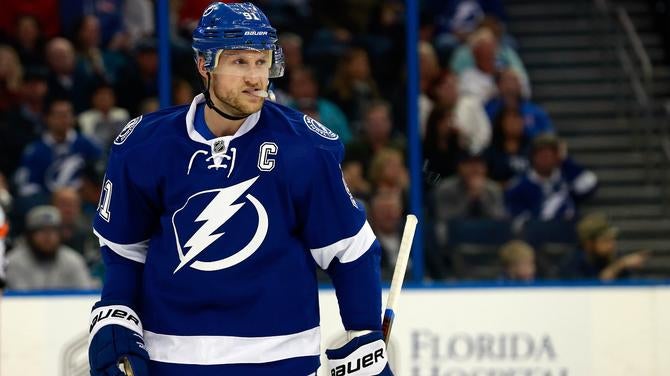At 12:01 a.m. ET Friday night, mere hours after the first round of the NHL Entry Draft wrapped up, general managers from opposing teams could officially reach out to Steven Stamkos. They can't offer him a contract yet, but their recruitment can begin in earnest. If he remains unsigned by Tampa Bay on July 1, he'll be free to do whatever he wants as a free agent.
Stamkos' options will be many. Choosing among them will be anything but easy, with a number of factors to consider. That said, it is extremely rare in today's NHL to see a free agent of Stamkos' caliber hit the open market.
At 26 years old, the Tampa Bay Lightning captain has played in 569 NHL games with 562 points over that span, including 312 goals. The only player with more goals since Stamkos entered the league in 2008-09 is Alex Ovechkin.
Stamkos has long said his preference in the scenario he now faces is to remain with Tampa Bay. However, GM Steve Yzerman's own success in building a championship caliber team may end up costing him his best player. It doesn't help that core players Victor Hedman, Ondrej Palat and Tyler Johnson, as well as goalie of the future Andrei Vasilevskiy and young Jonathan Drouin will all be due new contracts after next season or that the team's leading scorer last season, Nikita Kucherov, is awaiting a new deal as a restricted free agent now. That and the looming threat of the forthcoming expansion draft has forced the team into a situation where they may have to trade their starting goaltender Ben Bishop, a two-time Vezina Trophy finalist.
Fitting everyone under the cap means Tampa Bay can't offer Stamkos the most money. That doesn't necessarily rule out the Lightning, but it forces Stamkos to pass on the opportunity to earn one of the most lucrative contracts the NHL has seen in the salary cap era.
That has opened the door for a number of teams, some obvious and perhaps some less so, that can aggressively pursue and throw gobs of money at Stamkos. Of the teams in the conversation to attain the veteran center, none is better positioned than his current team to make a run to a title.
When Stamkos goes to make his final decision, he's going to be looking at all of the various monetary offers, but with a decision this big, so many other things will factor in. The roster of the prospective team, Stanley Cup aspirations, external endorsement opportunities, quality of life and whatever else matters to him personally. This is a seven-year decision here. So will he take a chance on a club in various stages of rebuilding? Or will he find a good fit and help turn a team into an immediate contender?
Let's take a look at his options with some pros and cons, both for him and the teams in pursuit.
All of the teams listed below have either been tied to Stamkos via public comments of the general manager or reports from reputable outlets. There are probably more teams that will get involved, but teams like Toronto, Buffalo and Detroit all look like the most capable of luring Stamkos away from Tampa.
Note: Just assume that one con for any team not named the Maple Leafs is the temporary headaches Stamkos will have to endure for passing on signing with his hometown team.

 Tampa Bay Lightning
Tampa Bay Lightning
Pros: The Lightning have the leg up in that they are the only team that can offer an eight-year deal. They're also, no doubt, Stanley Cup contenders in their current form, especially with Stamkos. There's no adjustment period and the only added pressure he'll face is that he takes up more of the team's salary cap. Also, Florida has some favorable tax laws.
Cons: The Lightning can't afford to spend as much as other destinations. According to reports, Stamkos is being offered a deal with an $8.5 million annual average over seven or eight years. Should the club re-sign him, they could end up losing one or more of their other core players in a cap crunch, potentially diminishing the roster unless they can find other ways to shed salary.
 Toronto Maple Leafs
Toronto Maple Leafs
Pros: The allure of playing at home has to be big. Should he sign, he's instantly the biggest star in the biggest hockey market on the planet. He'll have the chance to pursue Toronto's first Stanley Cup since 1967 and be lauded as a hero for the rest of his life (kind of like why Mike Babcock signed last year). Toronto can create the cap space to sign him for more than Tampa Bay can. On top of that, endorsement opportunities throughout Canada will abound, and there's nothing the salary cap can do about it.
Cons: The Maple Leafs are still in the early stages of their rebuilding process and were the worst team in the NHL last season. The pressure of playing the savior (or in this case, saviour) only pays off if he can deliver, even though it's up to management to build around him. There will be a honeymoon phase, but that pressure only mounts until the Cup is won. While they'll be able to create space, they may not be able to offer the most of any team in the running while they try to stick to the long-range plan they've put in place.
 Buffalo Sabres
Buffalo Sabres
Pros: Buffalo offers him a chance to be close to home but with less pressure of being the hometown star. Of the teams reportedly interested, they are best positioned to make him the biggest offer with a deep-pocketed owner and cap space to spare. Buffalo is among the most hockey-mad markets a player could find in the United States. Also, did we mention the dump truck of money they'd back up to his door? A $10-12 million AAV contract has been thrown out as a real possibility.
Cons: Like Toronto, Buffalo is still in the midst of a rebuilding process, though they may be a year or more ahead on that front. Buffalo would have to move one of their top two centers to wing to give Stamkos his preferred position (Ryan O'Reilly, most likely). While this isn't my personal opinion, the perception exists that Buffalo doesn't offer the lifestyle benefits some of these other markets can.
 Detroit Red Wings
Detroit Red Wings
Pros: The Red Wings have an immediate need at center and the cap space to make a huge offer. They'll be moving to a new building after next season. Detroit has a reputation of being one of the organizations that treats their players exceptionally well.
Cons: The Red Wings are in a weird limbo right now in terms of their roster. They're not rebuilding, but they don't look like much of a Stanley Cup contender at the present. Young players are starting to fill the roles held by longer-established veterans, but they have some significant holes that may take a while to fill, especially if they're capped out.
 Boston Bruins
Boston Bruins
Pros: Being a top-two center in a big market with quality players like Patrice Bergeron, Brad Marchand and David Krejci also up front would be appealing. They appear to have the cap space to make at least a competitive offer.
Cons: The Bruins have missed the playoffs each of the last two years and Stamkos doesn't help them address a defensive corps that has been struggling the last few years. Signing a big ticket player like Stamkos makes building around him and re-signing players like Brad Marchand in the near future more difficult to maintain that level of competitiveness.
 Vancouver Canucks
Vancouver Canucks
Pros: While not Toronto, playing in a major Canadian market should provide many opportunities for Stamkos away from the rink. This would be another savio(u)r opportunity as the Canucks have never won the Stanley Cup. As far as lifestyle goes, there are few better cities than Vancouver.
Cons: The Canucks do not look close to being a Stanley Cup contender without significant work around Stamkos. The Sedins are heading into the twilight seasons of their career. The Canucks' goaltending situation, both in the short term and long term, is far from settled. The current front office has not displayed much in the way of long-term vision for the roster with previous moves.
 New York Rangers
New York Rangers
Note: The Rangers would have to do a lot of work to move salary to make this happen, but John Shannon of Sportsnet mentioned the team as a potential suitor for Stamkos during their NHL Draft coverage. They're a longshot because of their cap situation and the amount they'd have to ship out, but they're an interesting enough entry to consider.
Pros: Stamkos has a chance to boost his profile in the U.S. sports landscape with success in the Big Apple. Playing for one of the league's most featured teams could present other opportunities away from hockey. Assuming the Rangers can move salary around, and they'd have to move a ton, they should be able to make an impressive offer. Assuming they don't have to shed too much to make this work, the Rangers should retain their status as a perennial playoff team.
Cons: Stamkos wouldn't fix the Rangers' biggest problem, which is its blue line. The Rangers may have to give up on one of their three prominent restricted free agents (Chris Kreider, J.T. Miller and Kevin Hayes) to make this work. There is some added pressure of being the top guy in a major media market. The Rangers' prospect system is severely depleted making the long-range picture less certain.






















